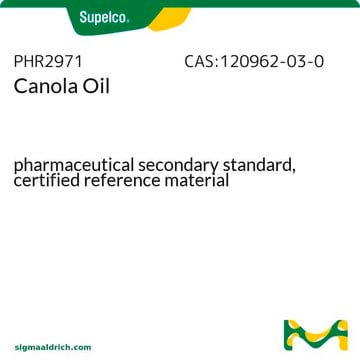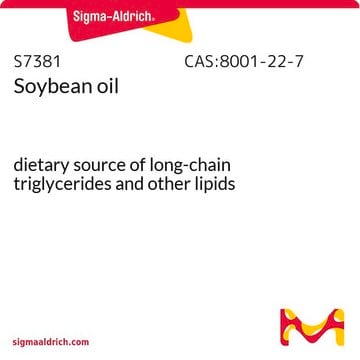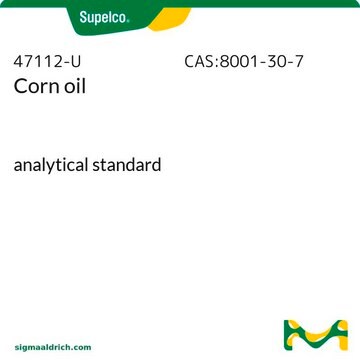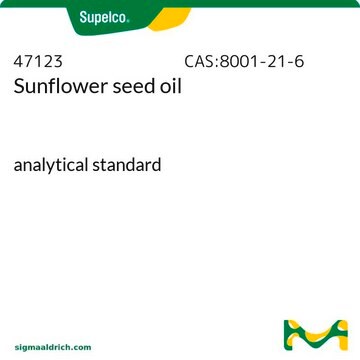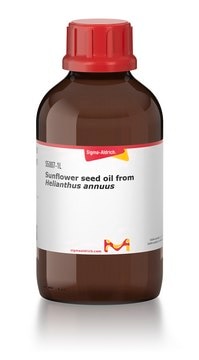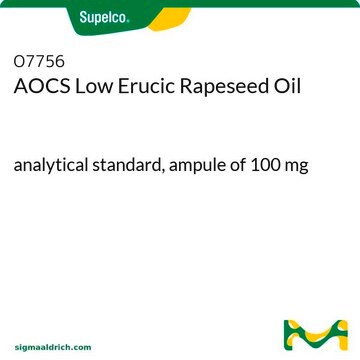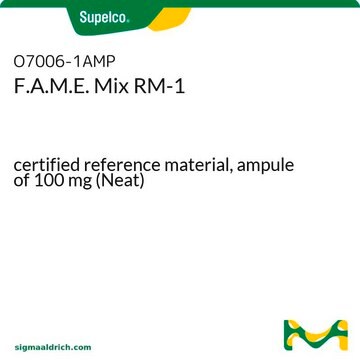46961
Canola oil
analytical standard
Synonym(s):
Rapeseed oil
Sign Into View Organizational & Contract Pricing
All Photos(1)
About This Item
Recommended Products
grade
analytical standard
CofA
current certificate can be downloaded
packaging
ampule of 1000 mg
technique(s)
HPLC: suitable
gas chromatography (GC): suitable
application(s)
food and beverages
format
neat
storage temp.
2-30°C
Looking for similar products? Visit Product Comparison Guide
General description
Characterized canola oil samples are available for use as controls or check samples for fatty acid methyl ester (FAME) analyses. These reference materials can be used as qualitative standards. They provide an excellent means of standardizing the lipid procedures and comparing the results to others. Packed in an amber ampule under nitrogen. A Certificate of Composition, which includes the chromatographic fingerprint analysis, is provided with the oil sample.
Application
Refer to the product′s Certificate of Analysis for more information on a suitable instrument technique. Contact Technical Service for further support.
Storage Class Code
10 - Combustible liquids
WGK
WGK 3
Flash Point(F)
Not applicable
Flash Point(C)
Not applicable
Personal Protective Equipment
dust mask type N95 (US), Eyeshields, Gloves
Choose from one of the most recent versions:
Already Own This Product?
Find documentation for the products that you have recently purchased in the Document Library.
Customers Also Viewed
Laziz Bouzidi et al.
Food & function, 4(1), 130-143 (2012-10-17)
Pure saturated triacylglycerols (TAGs) in canola oil were used as model systems to analyse oil loss in structured oil both from thermodynamic and kinetic perspectives. Two important parameters which effectively and predictively measure the relative propensity of a solid network
Ask the doctor. I use a lot of canola oil in cooking, because it's heart-healthy. My husband has prostate cancer, and I just heard that canola oil might make it worse. Is that really true and should I stop using it for cooking?
Anthony L Komaroff
Harvard health letter, 37(11), 2-2 (2012-10-19)
Cengizhan Yigitler et al.
Clinics (Sao Paulo, Brazil), 67(11), 1303-1308 (2012-11-28)
Postsurgical abdominal adhesions are common, serious postoperative complications. The present study compared the usefulness of 4% icodextrin and canola oil in preventing postoperative peritoneal adhesions. Twenty-four Wistar albino rats were divided into three groups. Following a laparotomy, a serosal abrasion
Jiang Jiang et al.
Meat science, 93(3), 469-476 (2013-01-01)
Alkali (pH(12)) and acid (pH(1.5)) pH-treated soy protein isolates (SPI) were incorporated (0.25-0.75% protein) into sols of myofibrillar protein (MP, 3%, in 0.6 M NaCl at pH 6.25) with or without 0.1% microbial transglutaminase (TG) to investigate the potential as
Nagao Totani et al.
Journal of oleo science, 61(11), 601-607 (2012-11-10)
We reported previously that in oils used for frying by commercial establishments, a high correlation was observed among their Gardner colors, polar compound contents (PC), carbonyl values (CV) and acid values (AV). However, this was not true for frying oils
Our team of scientists has experience in all areas of research including Life Science, Material Science, Chemical Synthesis, Chromatography, Analytical and many others.
Contact Technical Service
